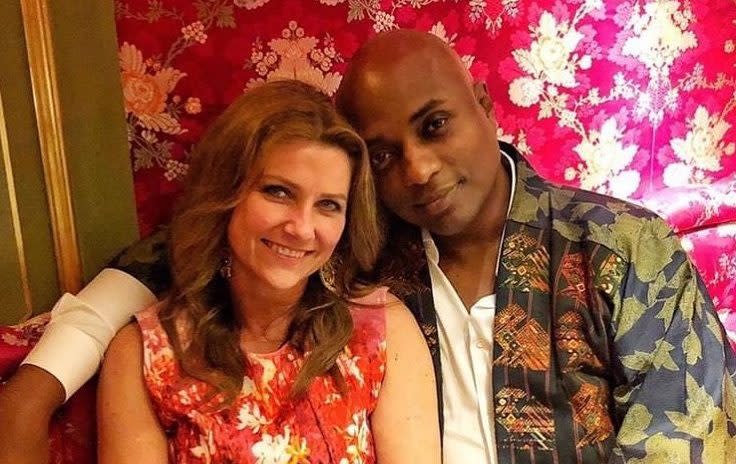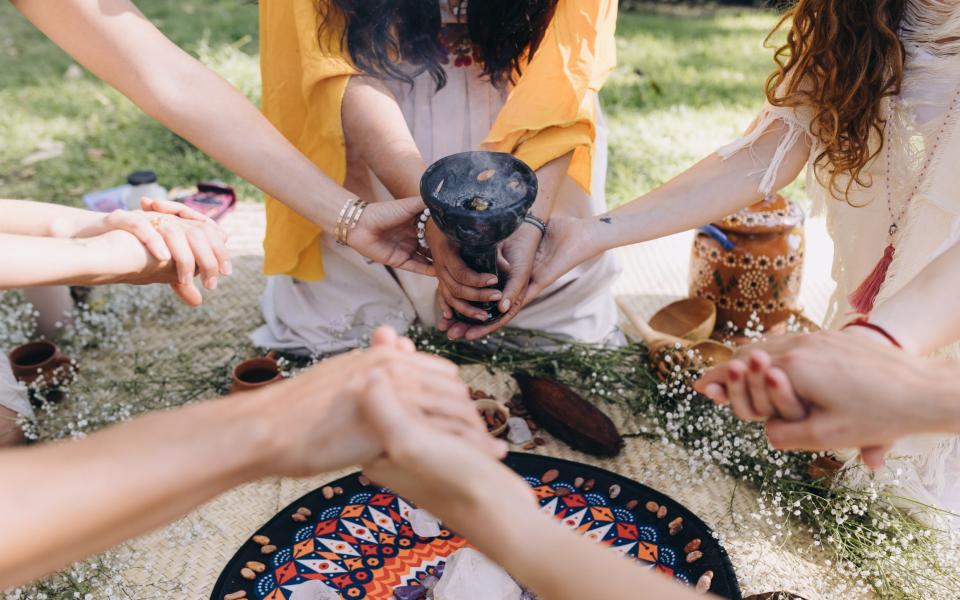How the one per cent abandoned conventional religion – and turned to Shamanism

First, they were interior designers, then they were psychotherapists, or sold bijoux jewellery or made high-end cupcakes. But now, the ladies of London have found a new calling, one which involves rattling bells, burning sage and charging clients the same rates as a corporate lawyer.
These women – and occasional men – are self-proclaimed shamans. And they have tapped – and microdosed – their way into a very happening trend.
According to the new Census report, Shamanism is the fastest-growing religion in England and Wales, with the number of people practising rising from 650 in 2011 to 8,000 in 2021.
If you’ve not signed up yet, don’t worry. It’s coming to a country spa or mid-sized city hotel near you soon.
You’ll be joining a congregation that includes fellow “worshippers” such as Jim Carrey, Sting, Jennifer Lawrence and Daniel Craig – though the High Priestess for Shamanism is surely Gwyneth Paltrow, who introduced us to the idea of having one’s own practitioner. In her case, a bisexual former model called Derek, who changed his name to Durek Verrett and whom Paltrow calls “her light in shining armour”.
Verrett (£1,600 an hour; website adorned with references from satisfied customers, sorry, clients such as actress Kat Graham, presenter Ricki Lake, and the late billionaire Sumner Redstone) is now engaged to Princess Martha Louise of Norway.
The princess has her own spiritual schtick going; she “makes contact with the dead”, apparently, which may have been how they met. Because – hold on – according to Paltrow’s Goop blog, Shaman Durek “had to actually die and then physically put himself back together” before he could start to practice. Presumably the couple met in – literally – another life, though who among us non-believers can say?
This may be off-putting. Communing with the dead may not be quite what you had in mind.
It’s why so many of us run for the hills when offered a laced “chocolate” at a dinner party (yes, these show up now in Notting Hill).
But then Shamanism, it should be stressed, is not your typical alternative therapy. Yes, you get to talk about yourself to someone who is paid to pretend to listen, and therefore has to put down their phone for 60 whole minutes – bliss – but it can be a tad on the psychedelic side. To wit, it often seems to involve magic mushrooms or to be more precise, the compound psilocybin found in such fungi, if one is to gain any benefit.
At least, it does if you take the extreme route to enlightenment – on one of the specialist treks in Peru or Jamaica (pro tip: check out the TripAdvisor reviews first). Also, much like a wax, don’t expect to enjoy it at the time. Vomiting often seems to be involved. Shamanism, it seems, is more about the after-effects than the time spent in situ.
Having said that, big Pharma is watching. Stories of recovery from cancer and depression after controlled psilocybin use are making doctors sit up and listen.
I have a young friend – we’ll call her Alice – whose search for respite from acute anxiety led her to one of the Balearic Islands. She tells me: “I thought I was going to be taken to some gorgeous mountain top to watch the sunset, but instead found myself an hour-and-a-half inland, driving down some dusty track to an open-fronted hut with bowls and coloured lights, meeting an older woman who didn’t speak a word of English.”
After eating chocolates – blessed and laced with psilocybin – Alice lay down on a mat and put on an eye mask. After two hours listening to the woman recite Irish poetry, she still felt nothing.
The woman then blew rapé (a type of tobacco that increases the effects) up her nostrils, which Alice describes as “wasabi x one million”. She adds: “You don’t know if you’re going to throw up or pass out.”
Suddenly Alice found herself weeping. “The woman held me in her arms, as though she knew I needed to be mothered.”
After four hours came the moment when “body and mind fully connected”. Her main thought was “that I never wanted this to end”. But the ceremony did finish after six hours with a bowl of vegetable soup (and a fairly substantial bill).
Since then, Alice says she feels less anxious and far more intolerant of toxic people.
“People are desperate to find a spiritual answer to get them out of their dysfunctional lives,” she says. “Personally, I think a lot of people can’t be bothered to do the work that therapy involves. They want to take the drugs to get out of their heads.” Indeed.

If you’re going to sign up for a more British approach – sans psychedelics, which are a Class A drug in the UK, though mushroom spores are not illegal – we have practitioners here, too. Lisa Butcher, TV presenter and chef Marco Pierre White’s ex, now runs retreats in Hertfordshire, where she helps “retrieves souls”. Among her many listed credentials are “Interdance Facilitator” and “Lightarian Reike Master”.
India Rose Waters, daughter of Pink Floyd co-founder Roger, learnt classical and core Shamanism at the feet of indigenous shamans from Sri Lanka, Burma, Mexico, Siberia and Bhutan. She has since offered shamanic work within the National Health Service (NHS).
Upper class truth-seekers head to Jo Bowlby (£250 an hour) who I met through Trinny Woodall years ago. I confess, I did have a session with her but can’t claim to have noticed any positive effects.
Perhaps it’s time to try again? At a dinner party recently, I met journalist-turned-shaman Anna Hunt (aka The Shaman in Stilettos), who conducts retreats in Peru and Spain, uses music and bells to release deeply-held tension, and admits to having once been mocked for her line of work.
But the pandemic, she says, has been good for business; Hunt now finds herself with a waiting list of people with conditions such as Long Covid – like me – and depression.
Covid, she says, “put a massive mirror to our face. It made us consider things we take for granted, like personal freedom. As a society, we are moving away from organised religion, but we want to believe in something.” And Shamanism, apparently, is it.

 Yahoo News
Yahoo News 
